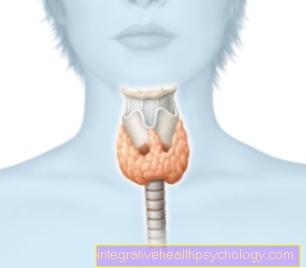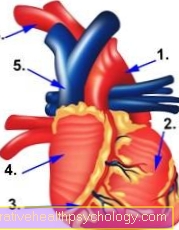stress
Synonyms
The word stress has different meanings. The first meaning is effort, the second meaning is strain, and the third meaning is effort. Furthermore, stress is also equated with irritability. Further synonyms are tension, tension, tension, excitement, fears, stress symptom, stress symptom, extreme tension, high tension, life crisis, pressure to perform, bullying stress, great exhaustion, stress, nerve stress, neurostress-related illness, exam stress, psychological tension, psychological tension, psychological problems , Tension, feeling of tension, states of tension.
English: stress

definition
Stress is an unspecific natural (physiological) Reaction of the organism to various internal and external influencing factors (Stressors). These stressors affect the balance of the human organism (Homeostasis) disturbed. The stress response then serves to restore homeostasis and well-being.
This stress reaction is modified by the individual assessment of the requirements of the situation and the available resources for dealing with the stressor. Stress occurs in two different ways, positive stress (Eustress) and the negative stress (Distress).
In the context of the term stress, the expression of the general adaptation syndrome should be explained here. This describes the reaction of the organism to a chronic stressor. It consists of an alarm reaction, a resistance phase and an exhaustion phase.
The stress response can be divided into two fundamentally different types, the physiological (physical) and the behavioral (behavioral) Stress response. The evaluation of the triggering stressor depends on the experiences, the genetic predispositions and the behavioral possibilities of the individual.
root cause
With the stress reaction / stress there are changes on different levels of the organism. On the psychological level, there is an increase in attention and readiness to react in order to be able to react to possible threats, emotionally this can be expressed in anger or fear. The hypothalamus-pituitary-adrenal axis is activated on the neo-hormonal level, with the release of corticotropin-releasing hormone from the hypothalamus, which causes the release of ACTH (adrenocorticotropic hormone) and cortisol from the adrenal cortex. Furthermore, the sympathetic-adrenal medulla axis is activated, which manifests itself in a release of adrenaline and noradrenaline. This activates the circulation, breathing and metabolism. The effect of this stress response, anti-productive, immunosuppressive, activating, should be short-lived.
In the case of chronic stress, the effects mentioned can have negative health effects on the individual. Thus, stress is a chemical reaction in the body. The body classifies a situation or requirement as stressful, dangerous or uncontrollable. As described above, the body reacts to this requirement by releasing various stress hormones. There are various stressors in the natural environment of those affected. One group is made up of medical diseases that can trigger stress on various levels. The other group includes competitive situations and performance reviews in school, university and work. What all these triggers have in common is that they have actual, mostly serious consequences for those affected.
To go a little deeper here, the above-mentioned stressors trigger cellular stress, which leads to an ongoing attack on cell walls. This is how diseases slowly develop. Damaging stressors such as heat, light, toxins, but also hormones as well as energy generation, create free radicals in the body that attack the cells. The body, on the other hand, has developed sophisticated protective mechanisms, including active repair and buffer systems and antioxidants, which, however, can be exhausted and collapse if the stress is too high.
Also read the article on the topic: Stressors
Typical symptoms of stress
Symptoms that are triggered during acute or chronic stress can be extremely diverse and vary from person to person in terms of severity and severity.
Acute stress symptoms:
- Increased sweating
- High blood pressure
- Increased heart rate
Chronic stress, on the other hand, is usually more diverse in terms of the variety of symptoms:
- Increased sweating
- High blood pressure
- Increased heart rate
- Gastrointestinal disorders (diarrhea, heartburn, constipation, vomiting and nausea)
- Headache (usually tension headache)
- sleep disorders
- Cold sore
- Irritable bowel syndrome
- migraine
Read more on the topic: Are you stressed? - these are the signs
Long-term effects of stress
What are the long-term effects of stress on life expectancy?
Basically, it must be stated that chronic stress can have a negative effect on life expectancy. The exact extent to which life expectancy varies greatly between the studies, which is why it cannot be clearly quantified. However, it is clear that chronic stress is a risk factor for cardiovascular diseases, the development of diabetes or high blood cholesterol (hypercholesterolemia), which can then lead to early death. The stress hormone cortisol is probably at the center of this development. This is released more and more during stress and slows down regenerative processes in our body.
Read more on the topic: Consequences of stress
What are the long-term effects of stress on blood pressure?
Chronic stress and the associated increased levels of stress hormones such as cortisol can have a long-term negative effect on blood pressure. It is not assumed that stress is the only risk factor that can lead to high blood pressure (arterial hypertension). But in people who have other risk factors or have a tendency to high blood pressure, chronic stress almost always has a negative effect on its course. Stress reduction has become an integral part of the therapy and prophylaxis of chronic high blood pressure.
What are the long-term effects of stress on the psyche?
Stress does not normally have a negative impact on our health and psyche. However, this assumes that the stress is not permanent, but that relaxation phases for the body and mind are possible. If this is not the case, chronic stress can definitely affect the psyche of those affected.
The extent of the psychological consequences can vary greatly.
The possible psychological consequences range from a slight feeling of exhaustion to the development of depression or a so-called “burnout syndrome”.
The latter is understood as a general emotional exhaustion that is associated with a significant loss of performance. This is usually difficult to distinguish from depression, as it can also be associated with listlessness, anxiety, low self-confidence and general dejection.
Read more on the topic: Depression
Stress is the main risk factor for the “burnout syndrome”. Research in recent years has shown that there is a clear connection between chronic stress and depression. This can work in both directions. Chronic stress can lead to the development of what is known as "stress depression". The other way around, however, an existing depression can also make it much easier to get into stress, which can then also lead to chronic stress.
Read more on the topic: Burnouts Syndrome
What are stress factors?
Basically, the term "stress factors", also called stressors, summarizes all external influences that can lead to a stress reaction.
Stress factors can be divided into different groups.These include physical, mental, and social stressors.
The group of physical stressors includes, for example, external stimuli such as:
- heat
- cold
- Noise.
Mental stressors are mostly based on internal or external performance demands. One of these is, for example:
- exams
- time pressure
- Solving difficult problems
Social stressors include
- interpersonal conflicts,
- Breakups,
- the loss of friends or loved ones,
- competitor
- or problems in a relationship.
From the examples mentioned, it is easy to see what is meant by “individual” stress factors, since every person makes or feels different demands on themselves and from outside. Requirements can act as a stress factor, but they don't have to. The perception of this depends largely on the subjective self-assessment and the feeling of being overwhelmed.
Since a lot is now known about chronic stress and its consequences, many people try to keep their stress level as low as possible. In order to achieve this goal, it is important to identify your own stress factors and find a way to deal with them.
One of the most frequent stress factors indicated in surveys is the increasing pressure to perform and deadlines at work. But permanent availability through digitization is also playing an increasing role as a stress factor. Furthermore, the double burden of work and family, serious illnesses, the loss of relatives or friends, fear of the future and excessive demands on oneself are given as the most important stressors.
It is clear that you cannot simply leave out all stressors in order to lower your personal stress level. The aim should therefore be to develop a good way of dealing with your own stress factors or to find ways to compensate for them through relaxing activities.
How does stress affect our cortisol levels?
Cortisol is a vital hormone in our body that regulates numerous functions in our body. Together with the hormone adrenaline, it is one of the most important representatives of the stress hormones, the function of which is to put our bodies on the alert and make energy reserves available. Cortisol levels are subject to normal fluctuations throughout the day.
The level can be increased up to five times during the day compared to the values at night. Thus the normal value lies between values of 45 and 225 µg / l over the course of a day. A stressful situation can lead to increased cortisol levels in our blood within a few minutes. The size of this rash depends largely on the strength of the stressor.
If the stressful situation has been overcome, the rash in the cortisol level will ebb over the next few hours. However, if you are under constant stress, such a reduction is only possible to a limited extent and the cortisol level is set to a higher base value, which can have serious consequences for the body.
What other stress hormones are there?
What all stress hormones have in common is that their effect is aimed at putting the body on alert and making energy reserves accessible. In addition to cortisol, there are a few other hormones that can be assigned to this group. Above all, the so-called catecholamines should be mentioned here.
These include the hormones adrenaline, noradrenaline and dopamine. Like cortisol, they are produced in the adrenal gland and from there enter the bloodstream. Adrenaline and noradrenaline are the fastest-acting stress hormones, and their levels rise the fastest in a stressful situation. They acutely lead to an increased heart rate, increased blood pressure and an increase in blood sugar in order to make the body perform at its maximum.
Only after a few minutes to hours of delay does an increase in cortisol follow, as its production first has to be stimulated by complicated hormonal cycles. On the other hand, its increased level in the blood lasts for a longer time than is the case with catecholamines. Other hormones in which an increased blood level is caused by stress are the antidiuretic hormone (ADH), prolactin and β-endorphin.
The connection between stress and other illnesses
Stress and burnout
We now know that there is a very clear connection between chronic stress and the development of burnout. The cause is seen as the combination of excessive demands and overwork, which play up each other and thus ultimately lead to a kind of vicious circle. Almost all those affected have strong external stressors that affect them.
This includes a stressful job with long working hours, conflicts with work colleagues or in the family, high performance and time pressure or low recognition of the work done.
This is usually accompanied by an internal burden, due to increased ambition, unrealistic expectations of one's own performance or excessive perfectionism. The development of a burnout syndrome is therefore the result of a long-term downward spiral, which is mainly caused by chronic stress. Thus, coping with stress is also the focus of burnout therapy. On the one hand, attempts must be made to reduce the strength and number of stressors and to find a sensible way of dealing with them. On the other hand, it makes sense to reduce your own performance requirements to a reasonable level.
Read more on the topic: Symptoms of Burnout Syndrome
Stress and gastric mucosal inflammation
Even if the exact mechanisms have not yet been clarified in detail, it has now been proven that long-term, high levels of stress can lead to an inflammation of the stomach lining, a so-called gastritis. It has been proven that people who suffer from chronic stress have an increased production of gastric acid, which can then irritate the gastric mucosa and thus lead to inflammation.
An inflammation of the gastric mucosa is treated with so-called proton inhibitors, which mean that less stomach acid is produced. However, if inflammation increases as a result of persistent stress, this can result in chronic changes in the gastric mucosa. If there is recurrent gastric mucosal inflammation that can be associated with increased stress, attempts should be made to reduce this in order to avoid secondary damage such as stomach ulcers
Read more on the topic: Inflammation of the stomach lining.
Stress and tinnitus
The diagnosis of stress-related tinnitus is not uncommon. In one study, 25% of those affected cited stress as the cause of their tinnitus. Stress is generally considered to be a risk factor for developing tinnitus. However, scientific evidence has not yet been found for this hypothesis. The most common thesis, however, assumes that the increased heart rate and blood pressure caused by stress can lead to changes in flow in the inner ear, which in turn cause the perception of tinnitus.
However, stress is not only considered to be a cause, but also a risk factor for the chronification of an existing tinnitus. In addition, the noises in the ears themselves can become a stress factor, which further increases the stress that may trigger. In patients with chronic tinnitus, it has also been shown that they perceive the intensity of the noises in the ears as more intense when they are in an acute stressful situation.
You may also be interested in this topic: Fever due to stress - is there such a thing?
Stress and asthma?
The extent to which the development and severity of asthma, more precisely bronchial asthma, depends on stress has been the subject of controversy in research for a long time. However, new research suggests that such a link exists. In terms of mechanisms, one must first differentiate between acute and chronic stress.
A strong acute stress reaction can lead to an increase in the respiratory rate, a so-called hyperventilation, which leads to irritation of the airways. This irritation can then lead to an acute asthma attack. But chronic stress can also promote the development of asthma. The influence of the stress hormone cortisol on the immune system modulates it in such a way that the allergic reaction of the airways to allergens can be stronger. On the one hand, this promotes the development as well as the strength of an allergic asthma.
Read more on the topic: asthma
Stress and rash with pustules
Almost everyone has suffered from stress-related pustules, acne, or rashes. Since science is now assigning ever greater relevance to this connection, dermatology has even developed its own specialty, so-called psychodermatology. The mechanism by which stress leads to changes in the skin has a major effect on the cortisol formed during stress. This namely inhibits our body's defenses, which normally protect our skin.
This promotes the formation of pustules or skin rashes. The resulting skin changes can be very diverse. In addition to simple pustules, stress can also lead to the development of psoriasis, neurodermatitis, hives or acne or worsen them. In addition to local treatment, the therapy of these skin changes focuses on reducing stress.
Read more on the topic: acne
Is there also stress for no apparent reason?
The creation of stress is always our body's reaction to a stress factor. In this respect, there is no stress that arises without a reason. Sometimes, however, we ourselves are not aware of the direct connection between the perceived stress and the triggering stressor. This can be the case, for example, when we are heavily burdened by other factors and even small triggers lead to a stress reaction, as the stress threshold is very low.
How can you improve your stress resistance?
It is well known that some people are more resistant to stress than others. Situations that are perceived as maximum stress by one person are nothing more than everyday stress for others. In times of increasing stress in everyday life, it makes sense to deal with how you can increase your own stress resistance.
One method by which this can be achieved is through mindfulness. Mindfulness describes the conscious perception of the current moment with regard to external factors, but also to emotions, thoughts and physical processes. This leads to being able to regulate one's own emotions better and to being able to deal more neutrally with stress-inducing situations.
The so-called mindfulness training usually consists of a form of meditation that focuses on the perception of internal processes and the attempt to gain a certain distance from one's own emotions. In addition to increased resistance to stress, it has been shown that mindfulness training can also increase concentration, productivity and general satisfaction.
Can you measure stress?
Acute stress causes a series of changes in our body, which are summarized as the so-called acute stress response. These include an increase in heart rate, an increase in blood pressure, increased sweating, a slightly higher body temperature and increased tension in the muscles. All of these parameters can be measured by various methods.
In this respect, it is not true that stress can be measured directly. However, it is possible to measure a person's individual stress response and thus, albeit with considerable inaccuracy, to infer the strength of the triggering stress trigger. In addition to this acute stress response, it is also possible to detect chronic stress by determining the cortisol level. This measurement is usually made by collecting urine every 24 hours, in which the cortisol level can then be measured.
Relaxation techniques
There are now countless relaxation techniques that can help reduce stress. However, not every technology works equally well for everyone and over time, many people develop preferences for certain methods. At the beginning of the search for the best individual relaxation technique, the motto is: try it out! The best known techniques include yoga and meditation.
Read more on the topic: How can you reduce stress?
However, both terms are just an umbrella term for numerous different subspecies. There is yoga that is more geared towards fast, athletic movements, but also very slow yoga that focuses on the search for calm. One of the most widely used types of meditation is mindfulness meditation.
If these types of relaxation techniques seem too exotic for you, you can also try more classic ways to find the right technique for you. These include breathing deeply with closed eyes before starting stressful work, listening to quiet music or, for others, doing sports.
Read more on the topic: Relaxation
prophylaxis
Resistance to stress is made up of three elements. On the one hand, there is a sense of commitment and responsibility, because when people are actively involved in everything they do, it protects against stress. The second element is the feeling of control, which manifests itself in the ability to focus on what can be changed in life and the confidence that one's activities are also useful. The third element is the challenge with the expectation that the changes in life will stimulate one's personal development. The ability to see stressful situations as opportunities. Adequate exercise in the fresh air is also considered stress prophylaxis. Furthermore, a balanced, healthy diet, adequate sleep and a good work-life balance.
Summary
stress is a very complex health problem if it exceeds the extent to which it can be balanced by the body. It influences many systems of the body and influences the cells, individual organs and the complex immune system of the body. Even the highly sensitive process of pregnancy can be strongly influenced by prolonged stress (see: Stress in Pregnancy).
There are, however, good treatment options against stress, ranging from supplementary therapy with substances that the body lacks, through exercise therapy, to psychosocial management systems. Stress prophylaxis in particular plays a special role, especially in our very accelerated times. A good work-life balance with sufficient Relaxation, Life control, Sports and challenges ensures a balanced homeostasis of the body and thus the stress resistance is very high.





























